




Dear Friends of Michigan Pharmacology,
I hope that you and yours are well and enjoying the Fall season with friends and family. I write to you this year with mixed news.
First, I am proud to report that Michigan Pharmacology has had another impressive year! I am excited to share our accomplishments with you. We look forward to continuing our momentum and world-class scientific impact in 2025.
Some of our highlights include:
• We held the 2nd annual Shaomeng Wang and Ju-Yun Li Lecture in November 2023, presented by Dr. Alan Ashworth, President of the UCSF Helen Diller Family Comprehensive Cancer Center.
• We held the 3rd Annual Pharmacology in Color Symposium on June 7, 2024. Dr. Trevor Archer, Deputy Director of NIEHS, was our keynote speaker.

• The NIH-funded Pharmacological Sciences Training Program T32 continues to train 12 pre-doctoral fellows each year.
• The NIH-funded Biology of Drug Abuse postdoctoral training program T32 grant was successfully renewed with 5 years of funding to support 6 fellows each year.
• Our two NIH U grants, with Michigan Pharmacology faculty members as principal investigators, are going strong.
• We awarded three new Pfizer-Upjohn Research Professorships in Pharmacology to Dr. Michelle Hastings, Dr. Emily Jutkiewicz, and Dr. Matt Brody.
• We recruited two new graduate student cohorts for Fall 2024: 14 Ph.D. students and 12 M.S. students.
• We welcomed three outstanding new faculty members to our Department: Dr. Jorge Ruas, Professor of Pharmacology with membership in the Stanley and Judith Frankel Institute for Heart and Brain Health; Dr. Sonya Wolf-Fortune, Assistant Professor of Pharmacology and Assistant Professor of Microbiology and Immunology, NIH MOSAIC K99/R00 scholar, with membership in the Elizabeth Weiser Caswell Diabetes Institute; and Dr. Julien Sebag, Associate Professor of Pharmacology with membership in the Elizabeth Weiser Caswell Diabetes Institute.
Second, despite our collective momentum and enthusiasm for science, we were devastated by the loss of our beloved colleague and friend, Dr. Emily Jutkiewicz in September 2024. As many of you know, Emily was an international thought leader in behavioral pharmacology as well as in graduate education and training. She served as Associate Professor of Pharmacology with tenure and Associate Chair for Education in the Department of Pharmacology. She was recently named the inaugural holder of the Pfizer/Upjohn Research Professorship in Translational Pharmacology.
A celebration of Emily’s life is planned for November 7th at 5 PM in the University of Michigan BSRB Kahn Auditorium. We have established a graduate education fellowship fund in Emily’s honor. Details can be found on the second to last page of this newsletter. Please consider making a tax-deductible gift to honor Emily and to help us continue her legacy and our mission to provide national leadership in pharmacology research and training.
Thank you for your continuous support of Michigan Pharmacology. I love hearing from our alumni, and I encourage you to share your ideas with me as we continue to move our Department forward. Go Blue!
With warmest regards and best wishes,

Lori L. Isom, Ph.D.
Maurice H. Seevers Professor and Chair of Pharmacology

“Michigan Pharmacology continues to promote a diverse, equitable, and inclusive culture: To create a climate that is safe, diverse, and inclusive – a scientific home where individuals from all backgrounds feel valued, welcomed, and appreciated. To be a place where faculty, staff, and trainees enjoy working, learning, and growing together. To be a place where people know that their voices are heard. To be a place that our alumni are proud to call ‘home’.”
- Dr. Lori Isom

Catherine Demery-Poulos and Krista Goerger join the Honor Society of Phi Kappa Phi
Catherine Demery-Poulos and Krista Goerger have joined the Honor Society of Phi Kappa Phi. Phi Kappa Phi is the nation’s oldest and most selective all-discipline collegiate honor society. Membership is by invitation only, with the top 10% of graduate students at each University nominated to join.
Congratulations, Catherine and Krista!


Dr. Matthew Brody is awarded the 2024 Cardiovascular Pharmacology Early Career Award
Matthew Brody, Ph.D., Assistant Professor in the Departments of Pharmacology and Internal Medicine, has been awarded the 2024 Cardiovascular Pharmacology Early Career Award. The ASPET Division for Cardiovascular Pharmacology Early Career Award has been established to recognize and honor individuals who are working in any area of Cardiovascular Science.
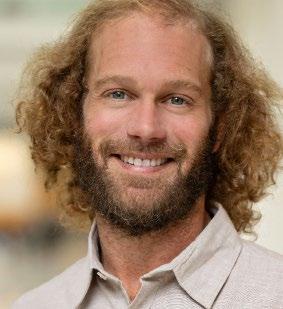
Dr. Brody is receiving this award in recognition of his pathfinding studies on intracellular signaling pathways that promote cardiac hypertrophy and failure, scientific scholarship, and strong commitment to the teaching and mentoring of younger scientists.
Read more here
Dr. David Jones receives Elizabeth Caroline Crosby Grant

David Jones, Ph.D., Assistant Professor of Pharmacology and Assistant Professor of Internal Medicine, has been awarded the Elizabeth Caroline Crosby Grant. The Elizabeth Caroline Crosby Grants program, facilitated by ADVANCE, funds a range of scholarly activities to meet the career-relevant needs of faculty members in science and engineering disciplines.
Learn more about the Elizabeth Caroline Crosby Grants program here.
Elizabeth Jaeckel has paper featured in the Journal of Neuroscience
Elizabeth Jaeckel’s (Birdsong Lab) paper, published in the Journal of Neuroscience, was chosen to be a featured article based on its positive reviewer feedback and perceived impact on the neuroscience field. It is titled, “Chronic Morphine Induces Adaptations in Opioid Receptor Signaling in a Thalamostriatal Circuit That Are Location Dependent, Sex Specific, and Regulated by μ-Opioid Receptor Phosphorylation.”
Read more here.
Congratulations, Liz!

Congratulations to our newly minted Ph.D’s who successfully defended their dissertations in 2024


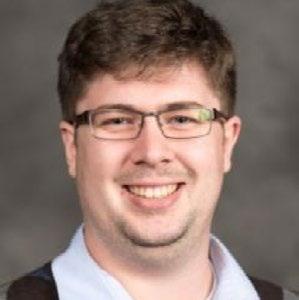


Juan Valentín-Goyco (Auchus Lab)
“Mechanistic and Pharmacological Studies of 11β-hydroxylase (P450 11B1) and Aldosterone Synthase (P450 11B2)”
Robert Goldsmith (Brody Lab)
“Characterizing the Role of Palmitoylation in Cardiac Fibroblast Activation and Fibrosis”
Benjamin Thompson (Satin Lab)
“The Relationship Between Metabolism and Calcium in Producing Islet Pulsatility”
Liz Jaeckel (Birdsong Lab)
“Effects of Chronic Morphine Treatment on Pre- and Postsynaptic Thalamo-Cortico-Striatal Mu Opioid Receptor Signaling”
Hao Chen (Puthenveedu Lab)
Investigating Fusion Machinery in G Protein-Coupled Receptor Exocytosis”



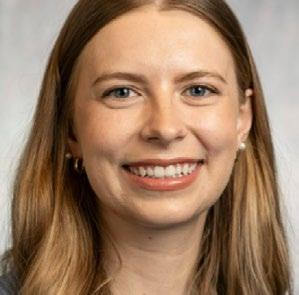

Jason Lin (Khoriaty/Shayman Labs)
“Genome-Scale CRISPR Screens Identify Novel Genes That Regulate Erythropoietin Production and Secretion”
Ian Chronis (Puthenveedu Lab)
“Regulation of Adrenergic and Proton-Sensing Receptor Function by Protein-Protein Interactions”
Yating Zheng (Courtney Lab)
“An Engineered Viral Protein Exploits LCK Kinase to Rewire T Cell Signaling Pathways”
Anne Lietzke (Soleimanpour Lab)
“Limitations in mitochondrial programming restrain the maturation of human stem cell-derived β cells”
Yang Xu (Parent and Coulombe Labs)
“Role of Stress Keratins in Short-Term Adaptation Responses to Repeated Inflammatory Stress in Mouse Skin”
John Traynor, Ph.D., is elected Secretary/Treasurer-Elect for ASPET

Dr. John Traynor, Edward F. Domino Research Professor of Pharmacology and Professor of Pharmacology, has been elected Secretary/Treasurer-Elect for the American Society for Pharmacology and Experimental Therapeutics (ASPET).
Congratulations, John!
Dr. Manoj Puthenveedu elected to the ACAPT
Dr. Manoj Puthenveedu, Professor of Pharmacology, was recently elected to the Advisory Committee on Appointments, Promotions, and Tenure (ACAPT) in the 2024 Medical School faculty elections.
Congratulations, Manoj!

50th Annual Pharmacology Colloquium (June 21, 2024) Winners:




Yating Zheng
1st Place in Oral Presentation
Rongxi Zhang
1st Place in Poster Presentation
Yang Xu
1st Place in Poster Presentation
James Teuber 2nd Place in Poster Presentation
Congratulations to the EBS Award Winners!
The Endowment for Basic Sciences (EBS) is a cooperative program consisting of Chairs and Directors of ten basic sciences units of the University of Michigan Medical School. The EBS works for the advancement of research and teaching through the development of new research initiatives and recruitment of new faculty. Every year, the EBS recognizes outstanding teaching effort and outstanding research support by issuing awards to two members of each unit.
Elizabeth Peckham, Ph.D., Instructor in Pharmacology, was awarded the EBS award for teaching, and Miranda Lau (Osawa Lab) was awarded the EBS award for research.
Congratulations to our award winners!
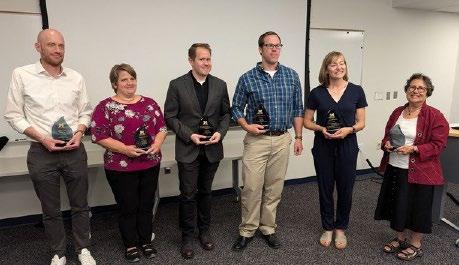

Dr. Kyoung Lee has been named a 2024 Rogel Scholar!
Please join the department in congratulating Dr. Kyoung Lee on being named a 2024 Rogel Scholar!
Rogel Scholar awards provide recognition and discretionary funds to support exceptional Rogel Cancer Center faculty members dedicated to pursuit of research to advance our understanding of the origins and behaviors of cancer and to achieving impact on cancer prevention, patient outcomes and quality of life for cancer patients, survivors and those at risk of cancer. Scholar awards are provided for a three-year term that can potentially be renewed for an additional two-year term.

The Rogel Scholar selection process is holistic in nature. Multiple factors are considered in the evaluation and decision process in making Rogel Scholar awards. Besides the excellence of the member’s scholarly contributions and potential for further innovation and impact in the upcoming period, to recognize and represent the breadth of the Rogel Cancer Center’s commitment across the full scholarly continuum in the Rogel Cancer Center, a range of other considerations are weighed, such as the following: i) the member’s cancer research focus; ii) recent and overall cancer-relevant funding and peer-reviewed publications as well as clinical trials roles; iii) range, depth, and consistency of collaborative engagement with other Rogel members in grants and publications; iv) formal and informal leadership roles and service contributions across the Rogel Cancer Center; v) scope and depth of participation in Rogel Cancer Center activities and initiatives; vi) training and mentorship contributions in the cancer area; vi) Rogel Cancer Center research program assignment, and U-M school/college and department appointment(s); vii) evidence of professionalism and collegiality; viii) other evidence of impact and contributions to the Rogel Cancer Center (e.g., cancer clinical care and cancer clinical trial contributions, service in Rogel community outreach and engagement activities, alignment with Rogel catchment area cancer goals and initiatives); and ix) overall alignment of scholarship and contributions with Rogel strategic priorities and objectives.

Jacob Ormes - 1st place, Behavioral Pharmacology Division Poster Competition
Gwen Burgess - 2nd place, Behavioral Pharmacology Division Poster Competition
Ben Clements - 1st place, Neuropharmacology Division
Postdoctoral Fellow Showcase
Congratulations, Jacob, Gwen, and Ben!
Deb Paris becomes the new
Chief Department Administrator of Pharmacology
Deb was selected as the top job candidate following a national search and extensive interviews with representatives from the dean’s office, other basic science CDAs, members of our faculty, members of our office staff, and members of our research staff. I am looking forward to partnering with her in her new, official role. Deb will be presenting her vision to the faculty during our upcoming faculty meetings. She will work with our office staff and with the other basic science CDAs to maximize the efficiency of our administrative mission. She will also continue to work with our research staff to make ordering, purchasing, and management of our physical plant run as smoothly as possible.
Welcome, Deb!
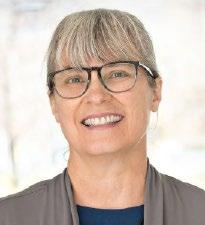
UM Pharmacology has recently submitted its nominations for the 2024 OGPS Graduate Student Awards/Phyllis M. Wise Graduate Student Awards in Biomedical Sciences.
The nominations are as follows:
Catherine Demery: Excellence in Service
Livia Stanger: Excellence in Research
James Teuber: Excellence in Leadership




1st Place: Livia Stanger
(Advisor: Mike Holinstat, Ph.D.)
“Sotagliflozin, a dual SGLT1/2 inhibitor indicated for diabetes, inhibits human platelet activation”
2nd Place: Cristian Martinez-Ramos
(Advisor: Yoichi Osawa, Ph.D.)
“Neuronal Nitric Oxide Synthase: Approaches to Obtain a Full-length Structural Model”
3rd Place: Kassidy Jungles
(Advisor: James Rae, Ph.D.)
“Targeting aurora kinase B (AURKB) as a radiosensitizing strategy in models of triple negative breast cancer (TNBC) and its implications on antitumoral immunity”
Yating Zheng, Ph.D. Student (Courtney Lab), was recently selected as a Major Symposium speaker for the American Association of Immunologists’ (AAI) IMMUNOLOGY2024 meeting – the premier immunology conference bringing together the best minds, sharing cutting-edge research, and providing opportunities to connect (held in Chicago May 3-7, 2024).

Zheng spoke to their research on how an engineered viral protein rewires signaling pathways to overcome T cell suppression as part of the Unleashing Targets for Novel Cancer Immunotherapies: Beyond T Cell Checkpoints Major Symposium, along with five faculty-level speakers and one other trainee-level speaker. Their research was also showcased in a Poster Session.
Zheng joined 15 additional AAI trainee members – graduate students and postdoctoral fellows – who were selected from 1,500 abstract submissions. This year marks the first time AAI has featured trainees in its annual conference Major Symposia.
“AAI’s annual meeting featured the latest research from some of the brightest minds in the field of immunology,” said Loretta Doan, CEO of The American Association of Immunologists. “AAI trainee members are making exciting discoveries every day, and we are thrilled to offer this high-profile honor for some of them to share their work with the community.”
To be considered as a trainee symposia speaker, the trainee must be the first author of the abstract and a current AAI member in good standing.
Congratulations, Yating!
Nicholas Kolbman and Kassidy Jungles selected as Rackham Predoctoral Fellows
Nicholas Kolbman (Ph.D. student, Pal and Mashour Labs) and Kassidy Jungles (Ph.D. student, Green Lab) have recently been selected as Rackham Predoctoral Fellows. This fellowship is one of the most prestigious awards granted by the Rackham Graduate School and provides financial support as students finish their thesis work. Read more here.
Congratulations, Nick and Kassidy!

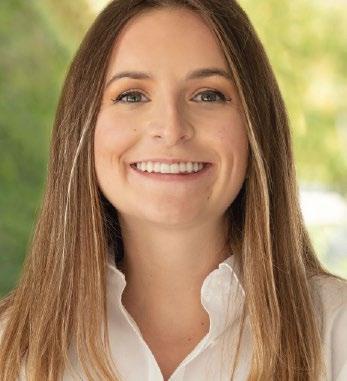
Subhash Arya, Ph.D., receives the 2024 Thermo Fisher Trainee Achievement Award
Subhash Arya, Ph.D., Postdoc Fellow in the Parent Lab, has recently been selected as a recipient of the 2024 Thermo Fisher Trainee Achievement Award. Established in 1997, these awards recognize promising trainees in the field of immunology.
Congratulations, Subhash!

Kassidy Jungles (Ph.D. Student, Green Lab) inducted into the Bouchet Honor Society
Kassidy Jungles (Ph.D. Student, Green Lab) has recently been inducted into the Bouchet Honor Society, a prestigious honor society for both academic achievement and promoting diversity/excellence in doctoral training.
Congratulations, Kassidy!
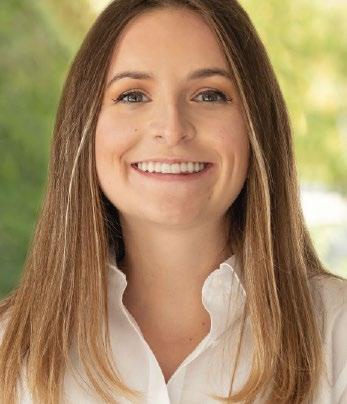
Krystal Santiago Colon receives 2024 National Science Foundation (NSF) Graduate Research Fellowship
Krystal Santiago Colon (Ph.D. Student, Mattis/Isom Lab) has recently been selected to receive a 2024 National Science Foundation (NSF) Graduate Research Fellowship. This is a highly competitive and prestigious national fellowship that provides support for graduate students across STEM fields.
Congratulations, Krystal!

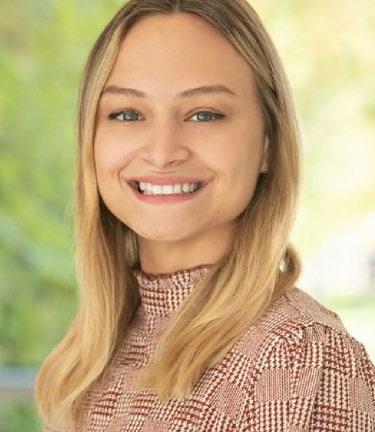
Juan Valentin-Goyco has PhD thesis paper shown as cover article of Biochemistry
Juan Valentin-Goyco (Ph.D. student, Auchus Lab) recently had his PhD thesis paper shown as the cover article of Biochemistry this month. Read the full article here.
Congratulations, Juan!

Mike Holinstat, Ph.D. has article posted in CELL
Mike Holinstat, Ph.D., Professor of Pharmacology, Professor of Internal Medicine, Division of Cardiovascular Medicine, and Professor of Vascular Surgery, recently co-authored an article, “An age-progressive platelet differentiation path from hematopoietic stem cells causes exacerbated thrombosis”, that was posted in CELL.
Read the full article here
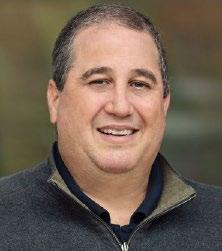
Gissell Sanchez, Ph.D. has publication come out in ASPET Molecular Pharmacology
Gissell Sanchez, Ph.D. (former Ph.D. student in the Smrcka and Jutkiewicz Labs) recently had publication come out in ASPET Molecular Pharmacology. Read more here
Congratulations, Gissell!
On April 1st, the medical school hosted a celebration of faculty who were appointed to named professorships in 2023. Leadership and 43 honorees were invited to gather in the Assembly Hall of the Horace H. Rackham Graduate School for a recognition ceremony and strolling dinner. Among these honorees, was U-M Pharmacology’s Michelle Hastings, Ph.D., who recently received the Pfizer Upjohn Research Professorship in Pharmacology.
Dr. Hastings is internationally renowned for outstanding RNA biology research. Her impactful contributions to the field of mRNA have opened the door to treat multiple genetic diseases, including cystic fibrosis and other genetic diseases where current treatment options are poor.

As a faculty member at the University of Michigan Medical School and director of the M-RNA Therapeutics Initiative, Dr. Hastings is passionate about graduate education and training and dedicated to increasing diversity in the STEM fields. She has made many valuable contributions to the development of junior scientists, in addition to her outstanding service contributions.
Congratulations, Dr. Hastings!
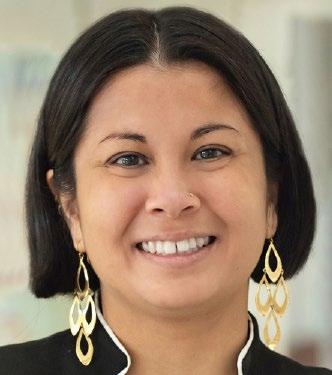

Jessica Anand, Ph.D. has article selected to be featured as ACS Editors’ Choice
Jessica Anand, Ph.D., Research Assistant Professor of Pharmacology, recently had her article “Structure Activity Relationships of the Fentanyl Scaffold: Identification of Antagonists as Potential Opioid Overdose Reversal Agents” selected to be featured as an ACS Editors’ Choice in addition to being published in ACS Chemical Neuroscience. Read more here.
Congratulations, Jess!
Wenhui Wei (former graduate student in the Smrcka Lab) has publication come out in AHA Journals
Wenhui Wei (former graduate student in the Smrcka Lab) recently had a publication come out in AHA Journals. Read more here
Congratulations, Wenhui!
Dr. Matt Brody receives the inaugural Pfizer Upjohn Early Career Research Professorship of Molecular Pharmacology
Please join the department in congratulating Dr. Matt Brody, Assistant Professor of Pharmacology and the Division of Cardiovascular Medicine in the Department of Internal Medicine, on his appointment as the inaugural Pfizer Upjohn Early Career Research Professor of Molecular Pharmacology!

Dr. Brody’s research program focuses on understanding the molecular basis of cardiac disorders, including heart failure and hypertrophy, with a specific focus on the role of novel posttranslational modifications such as palmitoylation, prenylation, and acylation. He has successfully established a well-funded and expertly staffed laboratory. He provides excellent mentorship to trainees and is an effective didactic teacher. He is establishing a national scientific reputation as a thought leader in cardiovascular pharmacology.
Congratulations, Dr. Brody!
Kassidy Jungles recently featured in Center for the Education of Women+ newsletter
Kassidy Jungles (Pharmacology
Ph.D. student, Green Lab) has been featured in the most recent Center for the Education of Women+ newsletter. Read the newsletter here
Congratulations, Kassidy!

FACULTY PROMOTIONS EFFECTIVE SEPTEMBER 1, 2024:
Dr. Paul Jenkins: Associate Professor of Pharmacology with tenure and Associate Professor of Psychiatry without tenure
Dr. Gregory Tall: Professor of Pharmacology with tenure
Dr. Colin Greineder: Associate Professor with tenure in Emergency Medicine and Associate Professor without tenure in Pharmacology
PLANNED FACULTY PROMOTIONS FOR SEPTEMBER 1, 2025:
Dr. Carrie Ferrario: Professor of Pharmacology with tenure and Adjunct Professor of Psychology, College of Literature, Science, and the Arts
Dr. Eric Jimenez Vazquez: Assistant Research Scientist of Pharmacology
FACULTY DEPARTURES:
Dr. Peggy Gnegy retirement
FACULTY HIRES:
Dr. Sonya Wolf-Fortune, Assistant Professor of Pharmacology
Dr. Ciria Quintero Hernandez, Joint Research Faculty
Dr. Julien Sebag, Associate Professor of Pharmacology
Dr. Hiroyuki Arakawa, Assistant Research Scientist of Pharmacology
Dr. Mariane Nascimento, Research Investigator of Pharmacology
Dr. Jorge Ruas, Professor of Pharmacology
Michael A. Holinstat, Ph.D., is recognized as the recipient of the 2024 ACTS
Distinguished
Educator: Mentorship Innovation Award
On April 3rd, the Association for Clinical and Translational Science (ACTS), a non-profit membership association of translational scientists from the nation’s leading academic medical centers, honored its Translational Science Award recipients at Translational Science 2024.
The University of Michigan is pleased to announce that Michael A. Holinstat, Ph.D, was recognized as a recipient of the 2024 ACTS Distinguished Educator: Mentorship Innovation Award.
Dr. Holinstat is a professor in the Departments of Pharmacology, Internal Medicine and Surgery at the University of Michigan Medical School and a fellow of the American Heart Association. His research interests focus on understanding lipid, lipoxygenase, and oxygenase regulation of platelet signaling and function and how it relates to regulation of hemostasis and thrombosis.

Dr. Holinstat serves on several national boards including the sub-committee on Hemostasis and Thrombosis at the American Society for Hematology and the Director for the NIH CTSI-funded Michigan Institute for Clinical & Health Research (MICHR) Predoctoral T32 training grant in clinical research. He has received several national awards including the Kenneth M. Brinkhous Young Investigator Prize in Thrombosis from the Council on Arteriosclerosis, Thrombosis, and Vascular Biology in 2012 and the Young Investigator Award in Structure-Function from the Eicosanoid Research Foundation in 2013. In addition to his NIH-funded research, Dr. Holinstat continues to translate his discoveries into potential clinical applications through collaborations with Veralox Therapeutics, Cereno Scientific, and Lexicon Pharmaceuticals.
Dr. Holinstat has spent the last 20 years training the next generation of clinical and translational scientists in the area of blood clotting, platelet biochemistry, and discovery of novel therapeutic approaches for treating thrombosis including undergraduates, graduate students, postdoctoral fellows, clinical fellows, and basic and clinical faculty.
ACTS presents its annual Translational Science Awards to recognize investigators for their outstanding contributions to the clinical research and translational science field. Individuals and teams are nominated by their colleagues and peers and may be selected from all industry segments.
“The ACTS awards recognize talented investigators who translate their findings ultimately from the bench to the community. Awardees are in all phases of studies and disciplines throughout the workforce which includes investigators, trainees, educators, and research teams. We also advance the principles of diversity, inclusion and health equity”, said ACTS President Linda B Cottler, PhD, MPH, FACE. “These award winners and their work represent the values and mission of ACTS and we are happy to celebrate their achievements at Translational Science 2024.”
The ACTS Distinguished Educator: Mentorship Innovation Award recognizes distinguished mentors with outstanding innovation in mentorship resulting in significant scientific accomplishments by the next generation of clinical and translational researchers and/or innovative approaches in mentorship to promote diversity and retention of under-represented groups in translational research.
Dr. Les Satin joins the ProQuest Distinguished Dissertation Awards Committee
Dr. Les Satin, Joanne I Moore Research Professor of Pharmacology, Professor of Pharmacology, and Professor of Internal Medicine, has been asked to join the ProQuest Distinguished Dissertation Awards Committee of the University of Michigan. The ProQuest Distinguished Dissertation Awards (DDA) recognize exceptional work produced by doctoral students for the high caliber of their scholarship and the significance and interest of their findings. Each year, Rackham invites faculty to nominate outstanding dissertations produced in their programs. The awards committee consists of senior faculty who review the nominations, support letters, dissertation abstracts of nominees, and the CVs of the best PhD students. The committee then meets to narrow the field to 20 finalists.
Dr. Michelle Hastings has RNA therapeutic being used to treat twins with ultra-rare form of Batten disease
RNA therapeutic (developed by Dr. Michelle Hastings) is being used to treat twins with ultra-rare form of Batten disease. It’ll be used to correct genes with specific mutations, like the CLN3 mutation responsible for the girls’ disease. Read more here
It is our pleasure to announce that Alanna Shahly has accepted the position of Research Administrator Senior in Pharmacology. She will start on September 1, 2024. Alanna will be providing both pre- and post-award support as well as other administrative and financial duties. Alanna joined the University of Michigan in 2018 and has research administration experience in the Department of Psychiatry and was most recently a Financial Specialist at the Biointerfaces Institute at NCRC.



After growing up between Stavanger, Norway and Metro Detroit, Alanna received her BA at the University of Michigan and MPA at Wayne State University. She then began working in grants at a variety of metro Detroit area nonprofits prior to joining UM. Alanna particularly loves a good spreadsheet, project managing a proposal submission, running forecasts, and color coding everything. When off the clock, Alanna obsesses over her garden in the spring and summer, screams at the TV in the fall (GO BLUE!), and knits and bakes in the winter. She spends entirely too much time with her nose stuck in a book, and is constantly covered in fur thanks to her two dogs -- an Akita/Chow-Chow/Pit mix, Lady Helianthus Hippolyta, who goes by Helo and a Great Pyrenees, Viscount Apollo Revelstoke of Numenor, who goes by Apollo.
Drs. John Traynor and Carrie Ferrario’s program receives funding from NIDA for a 5 year Postdoctoral training grant on the Biology of Drug
The University of Michigan was awarded a $500,000 federal grant earlier this summer to support postdoctoral fellows in their efforts to uncover how recreational drugs like fentanyl, methamphetamine and THC affect biological processes throughout the brain and body.
The funding, provided by the National Institute on Drug Abuse, will support six fellows from multiple disciplines, including psychology, pharmacology, psychiatry and neuroscience. Trainees will work with faculty mentors to determine how recreational drugs affect brain function and behaviors. This work will provide key information that is needed to address substance use disorders amid the ongoing opioid epidemic.
Nationally, opioid overdoses account for more than 78,000 deaths annually, according to provisional data from the U.S. Centers for Disease Control and Prevention. In Michigan, that number totaled more than 2,200 in 2023.
“Addressing the opioid epidemic with evidence-based solutions is paramount, and being able to support the next generation of researchers in that endeavor is encouraging,” said Dr. John Traynor program director and Edward F Domino Research Professor of Pharmacology.
“This funding will help us bring together trainees that may not otherwise cross paths and provide an opportunity for innovation and collaboration to solve this pressing societal need.”
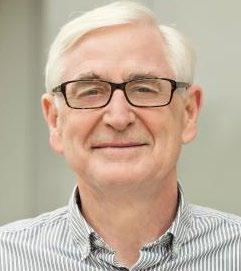

By integrating the fields of biology, pharmacology, psychology and psychiatry, fellows will work to better understand the basic biology of neurotransmitter systems (chemical messengers that help nerve cells communicate with each other) and how these influence behaviors that drive drug use in humans.
The training program, set to be hosted within U-M’s Department of Pharmacology within the Medical School, will be funded for five years and will be the only postdoctoral training program at the University that focuses on the neurobiology of drug use disorders from a basic sciences perspective.
The program will begin July 1 with the inaugural cohort of fellows who will begin their work in the fall of 2024. Fellows will attend annual scientific conferences while also participating in workshops and seminars to showcase their work and build partnerships across the research community.
“As a research university, we have an obligation to use our knowledge and skills to tackle the most challenging issues facing our world,” said Dr. Carrie Ferrario, program co-director and Associate Professor of Pharmacology.
“We are honored to receive this funding and will use it to bring new voices and ideas to the forefront of this critical area of research.”
In February, the Department of Pharmacology enjoyed some “Osawaffles” in room 1301. This event has become an annual tradition for students, staff, and faculty to informally chat while waiting for waffles to be cooked. The tradition of Osawaffles was started about 20 years ago upon a chance conversation between Professor Osawa and then student, Cheryse Sankar, about finding a way to unite fellow students and colleagues. The event is one of many that continues to reflect the collegiality of the Department.



The Department of Pharmacology held its annual Welcome Picnic on Friday, August 9, 2024 at Olson Park. Faculty, staff, and students attended and the picnic was enjoyed by all. Catering was provided by Satchel’s BBQ, while attendees listened to live music from the band, Ferrario.



The Department of Pharmacology held its annual retreat at Maumee Bay Resort and Conference Center on September 9-10, 2024. Faculty, staff, and students participated in many activities, including a jeopardy game (led by Dr. Jorge Iniguez-Lluhi), a poster session, oral presentations, and a keynote lecture entitled “Repurposing drugs for a rare disease” given by Dr. Richard Auchus.



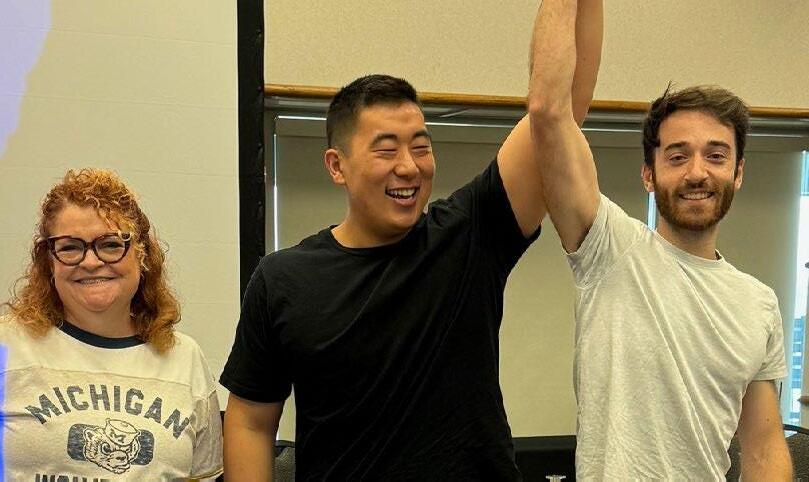




”Achieving excellence in pharmacology science and education depends strongly on a communal effort to nurture an inclusive and respectful environment for our entire community. It is our responsibility to strive every day towards this goal.”
- Jorge Iniguez-Lluhi
Assoicate Chair, Department of Pharmacology and Associate Professor of Pharmacology
Did you know that Namandjé N. Bumpus, currently the Principal Deputy Commissioner at the FDA, was first recruited to our department as a Charles Ross Summer Undergraduate Research fellow? She subsequently joined our graduate program and carried out her doctoral studies in the laboratory of Dr. Paul Hollenberg and graduated in 2007.
“The mentorship and education I received during my time as a graduate student in pharmacology at the University of Michigan was tremendously meaningful for me and is a major part of the reason that I pursued the academic path following my graduate training”
Learn about her current role at the FDA here.


This Charles Ross Summer Undergraduate Research Fellowship program was established in 1991 to honor the legacy of Dr. Charles Ross, a prominent pharmacologist and one of the first African American scientists to earn a Ph.D. in our Department. The program has awarded nearly 100 fellowships to provide under-represented minority students, first-hand laboratory experience in pharmacology research.
Learn more about the program here
The 2024 Pharmacology in Color Symposium, founded by our students of color, featured research of current trainees, the wisdom of alumni leading wide ranging careers, and Dr. Trevor Archer, Deputy director of NIEHS, as the keynote speaker.
A great day growing our network for all trainees!


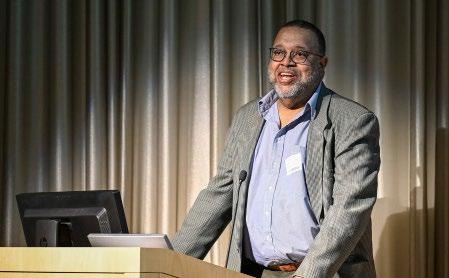
Pharm DEI committee meets monthly for planning purposes. The minutes of the meetings are posted on our website
Email: pharmacologydei@umich.edu
We encourage feedback and ideas on how the Pharmacology Department is doing in terms of its DE&I efforts. Please use this feedback form to provide any comments or suggestions.
DEI minigrant initiative: Funding is available for anyone interesting in organizing DEI related activities! Grants of up to $1000 can be awarded. This year funds supported the efforts of our trainees in the Wolverine Pathways Program. To apply for a grant, submit your idea to the DEI committee at pharmaclogydei@umich.edu.
Welcoming our new students and postdocs to UM Pharmacology!
Welcome to our 2022 Incoming Masters Students! Welcome to our 2024 Incoming M.S. Students!
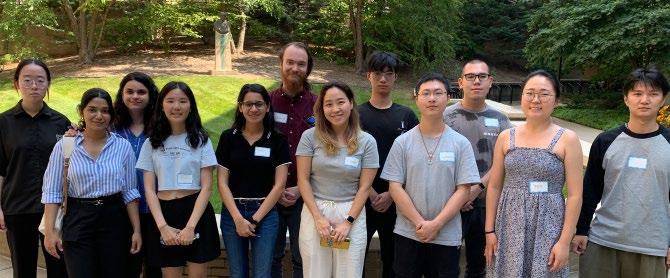
Welcome to our 2024 Incoming Ph.D. Students!

Please welcome our newest postdocs!

Cagney received her B.S. in Biology from Virginia State University and her Ph.D. in Molecular Biology from the University of Kentucky. She is the 2022 Hanna H. Gray Fellow. Her research states that neural circuits are the fundamental connections underlying all brain functions, from cognition to behavior. Understanding these complex pathways has important implications for neuroscience research and human neurological disorders. Cagney is generating transgenic tools – which change an organism’s DNA – for transsynaptic tracing in zebrafish to map, monitor, and manipulate neural circuits. She aims to apply these powerful techniques to study neural circuit dynamics in both the developing and regenerating nervous system. She will be receiving postdoctoral training in Dr. Kevin Jones’s lab.
Yuling obtained her B.S. in Biomedical Science and earned her Ph.D. in Biology from Queen Mary University of London, specializing in relaxin receptor signaling and GPCR evolution. She is currently a postdoctoral Research Fellow in the Tall lab where she is delving into the study of adhesion GPCRs, aiming to enhance the comprehension of their physiological mechanisms.


Manuj has recently joined Dr. Lorberbaum’s laboratory as a Postdoctoral Researcher. Before this position, he completed a dual Ph.D. program in “Stem Cells in Pancreatic Development and Diseases” under the guidance of Dr. Anthony Gavalas at Technical University Dresden (TUD) in Germany and King’s College London (KCL) in the UK. His doctoral research focused on addressing organ shortages for Type 1 diabetes treatment. He led projects that included (a) differentiating human pluripotent stem cells into islet-like clusters, (b) expanding pancreatic progenitors, and (c) creating functional vascularized islet-like clusters. Before earning his Ph.D., Manuj completed a Master’s degree in Human Genomics at Panjab University, Chandigarh, and a Bachelor’s degree with honors in Zoology from the University of Delhi, New Delhi, India. His extensive research background, internships, and academic experiences have significantly influenced his expertise and enthusiasm for stem cell biology. At the University of Michigan in Lorberbaum’s lab, he aims to further his research on the differentiation of human pluripotent stem cells into islet-like clusters, contributing new insights and advancements to the field of stem cell-derived islet therapies.
Why do we binge? The Goforth lab explores the neural mechanisms underlying food intake and alcohol consumption. We examine how satiety signals from the gut and periphery regulate specific neurons in the hindbrain and how these satiety circuits interact with input that drives reward-seeking in higher brain regions such as the thalamus. Our lab uses a diverse array of tools to study neuronal function and circuitry from the cellular level to the whole animal. We seek to uncover how disruptions in these physiologic systems lead to or are altered by disease processes, such as obesity, dysregulated feeding, stress/anxiety and substance use disorders. Of particular interest is understanding how incretins, such as Glp-1 and GIP, and neuropeptides, such as hypocretin/ orexin modulate hindbrain and thalamic cells.
Orexin (OX), also known as hypocretin, refers to a group of neuropeptides, OX-A and OX-B, produced by neurons in the hypothalamus. OX peptides act at two receptor subtypes 1 and 2 (OX1R and OX2R) to regulate various physiological processes,

including the regulation of sleep-wake cycles, arousal, appetite, regulation of energy homeostasis, reward pathways, and stress responses. Pharmaceuticals targeting orexin receptors are being explored for their potential in managing sleep disorders and other neurological and psychiatric conditions. We have developed unique genetic mouse models to identify and selectively modulate the activity of OX1R or OX2R- expressing neurons and are using these models to examine OX signaling in regions such as the thalamus, which impact feeding behavior, reward seeking, and the stress response.
Physical exercise and muscle condition play an important role in disease prevention and treatment. This is due to the mobilization and use of energy stored in the body, and to factors released by trained muscles (myokines and exerkines) that promote a healthy body and a healthy mind.
The Ruas Lab is dedicated to discovering the key molecules that mediate the health benefits of exercise, to create exercise-based medications. Over the years, we have identified several metabokines, myokines, and exerkines (and their receptors), which we are exploring as pharmacological tools for the treatment of diabetes, obesity, cardiovascular disease, neuromuscular and neuro-degenerative diseases, mood disorders, and cancer.

The Sebag lab is focused on identifying and understanding novel methods to regulate energy and glucose homeostasis by studying the mechanisms underlying the regulation of proteins responsible for controlling appetite and through drug discovery programs aimed at developing new treatments for obesity and diabetes. We made fundamental discoveries in the field including characterizing the role of accessory proteins like MRAP2 in the regulation of GPCR signaling and their effects on energy homeostasis. We showed that MRAP2 regulates appetite by altering the pharmacology and localization of several GPCRs including MC4R, the ghrelin receptor and the Prokineticin receptor 2. Recently, we identified Unc119b as a new target for the treatment of insulin resistance and type II diabetes and small molecule inhibitors of Unc119b with in vivo efficacy in models of insulin resistance. We are excited to join Pharmacology at Michigan and look forward to foster new collaborations with new colleagues, host rotation students and continue to grow our work at the University of Michigan.
Type 2 diabetes (T2D) is a complex disease that affects around 34.1 million adults in the U.S., and the incidence has been increasing by 5% every year. Several risk factors are traditionally linked to the development of T2D, including body weight, level of physical activity, and genetic predisposition. Over the past several years, there has been growing evidence demonstrating an association between psoriasis, a chronic inflammatory skin disease that affects around 7.4 million adults, and increased risk for T2D. This link is important since the combination of psoriasis and T2D worsens glycemic control to a greater degree, leading to increased secondary complications than either disease alone. There are currently no proven treatment strategies to prevent T2D development in psoriasis patients. Our lab aims to understand the molecular mechanisms linking chronic skin inflammatory conditions, such as psoriasis and metabolic dysfunction. Current areas of research in the lab focus on 1) understanding the epigenetic mechanisms regulating keratinocytes and immune cell phenotypes in psoriasis and 2) exploring structural-immune cell crosstalk in psoriasis-mediated metabolic dysfunction.


Our lab utilizes transgenic mouse models and human cells to uncover new molecular pathways important for regulating keratinocyte inflammatory profiles and immune cell phenotype to identify new targets for therapeutic intervention for patients with chronic skin inflammatory conditions and T2D. We were excited to get started over the summer and enjoyed various activities such as kayaking on the Huron River. We look forward to welcoming rotation students in the lab.
August 18, 1975 – September 21, 2024
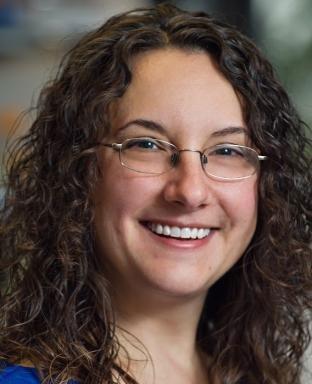
Emily was born in Natick, Massachusetts in August 1975 to Charles and Marie Jutkiewicz. She attended Tufts University where she graduated with a degree in Biology. She had a great passion for dancing and co-founded the Tufts Ballroom Dance Club. As an undergraduate, she began her career as a researcher studying biopsychology. After graduation she continued her research at McLean Hospital, Harvard Medical School and then in 1999 joined the pharmacology graduate program at the University of Michigan in Ann Arbor. Her thesis studied new approaches to the treatment of depression. She obtained her PhD in 2004. During this time, she met her husband to be David, and made many life-long friends. Emily and David were married in Boston in September 2006. Emily stayed at the University of Michigan to do postdoctoral work in pharmacology, became a faculty member and rose through the ranks to her current position as Associate Chair for Education and the Pfizer/Upjohn Research Professor of Translational Pharmacology. In addition to her internationally recognized research, Emily was an exceptional teacher and mentor. Her passion for her work was evident to all that had the privilege to work with her. At home she was a terrific cook and loved to prepare extensive meals for her family and friends. Emily was a devoted wife to David and wonderful mother to her loving sons, Jack and Sam, who brought immense joy to her life.
In lieu of flowers, the family kindly requests that donations be made to the college funds for Emily’s sons Jack and Sam. Your generosity will support the educational dreams of the boys in years to come. Instructions for making a donation can be found here
Enter the Ugift code:
X2Z-31N for Jack
63Q-U9S for Sam
In support of the family, a meal train has been set up to help with meals during this difficult time. Details can be found here.
Dr. Jutkiewicz’s research program has made important contributions to our understanding of opioid mechanisms contributing to analgesia and depression, the role of endogenous opioid peptides and delta opioid receptors in generating and maintaining the salience of drug-paired cues to perpetuate addiction and induce relapse, and the long-term consequences of exposure to drugs of abuse during adolescence. She discovered that the delta opioid receptor system can modulate behavior and neurobiological activity related to emotional control and reward processes. In addition to leading a productive research program and providing outstanding mentorship to trainees, Dr. Jutkiewicz has provided outstanding service to the Department of Pharmacology, the Program in Biomedical Sciences, and Rackham Graduate School as Associate Chair for Education in Pharmacology and Chair of the Pharmacology Graduate Program and Pharmacology Education Leadership Committees.
On November 7th, a memorial ceremony will take place for Dr. Jutkiewicz, where her family will be presented with a medallion that will honor her as the inaugural Pfizer Upjohn Research Professor of Translational Pharmacology.
We are deeply grateful to Dr. Jutkiewicz for her outstanding service to our Department as well as her contributions to our understanding of opiate pharmacology, and she has left an unfillable void in our Department and in our hearts.
Gifts made in memory of Dr. Jutkiewicz will support the Dr. Emily M. Jutkiewicz Award Fund in the department of Pharmacology at Michigan Medicine. The fund will be used to establish a fellowship award to support a doctoral student pursing their PhD in Pharmacology.
DONATE TO THIS CAMPAIGN HERE
*Gifts to endowment funds will be administered as a permanent endowment under Michigan law and University of Michigan policies. Distributions from the Fund shall be made in accordance with the University’s then existing endowment distribution policy. If there are surplus distributions at the end of any fiscal year, the University may, in its discretion, hold them to be spent later for the above purposes or add them to the principal of the Fund for investment.



Please support graduate education at Michigan Pharmacology
Your donations fund learning and training opportunities for our outstanding graduate students, enabling them to advance their knowledge and enhance their skills in basic science research in varied and complex areas of study.
https://victors.us/pharmacologygradfund
https://victors.us/dominoresearchcenter
For any questions, please contact Melissa Lynch (lymeliss@med.umich.edu).

DEPARTMENT OF PHARMACOLOGY
University of Michigan Medical School 2301 MSRB III 1150 W. Medical Center Dr. Ann Arbor, MI 48109-5632 USA
(734) 764-8165
https://medschool.umich.edu/departments/pharmacology

umpharmacology/

https://www.linkedin.com/ groups/5162943/profile

@UMPharmacology
2024 Pharmacology Newsletter Editor and Content Manager: Katie Hildebrand
Executive Officers of Michigan Medicine: Marschall S. Runge, M.D., Ph.D., executive vice president for medical affairs, dean, University of Michigan Medical School, CEO, Michigan Medicine; David A. Spahlinger, M.D., president, UMHS, and executive vice dean for clinical affairs, University of Michigan Medical School; Patricia D. Hurn, Ph.D., dean, School of Nursing.
The University of Michigan, as an equal opportunity/affirmative action employer, complies with all applicable federal and state laws regarding nondiscrimination and affirmative action. The University of Michigan is committed to a policy of equal opportunity for all persons and does not discriminate on the basis of race, color, national origin, age, marital status, sex, sexual orientation, gender identity, gender expression, disability, religion, height, weight, or veteran status in employment, educational programs and activities, and admissions. Inquiries or complaints may be addressed to the Senior Director for Institutional Equity, and Title IX/Section 504/ ADA Coordinator, Office for Institutional Equity, 2072 Administrative Services Building, Ann Arbor, Michigan 48109-1432, 734-763-0235, TTY 734-647-1388, institutional.equity@umich.edu. For other University of Michigan information call 734-764-1817.
© 2024 Regents of the University of Michigan: Jordan